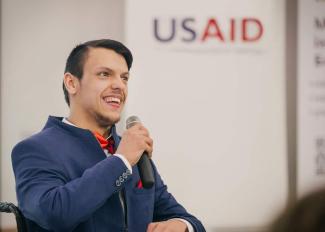"It is impossible to live an active life if a person stays at home and doesn’t have the opportunity to be a part of society. The first time I thought about it was when I had to learn how to take care of myself at the age of 12," says Eduard Kluisha, now 25 years old. He has cerebral palsy and uses a wheelchair but has managed to successfully overcome daily obstacles to achieve his dream of becoming a professional photographer. Eduard has won several photo competitions, spoken at the International Conference on Population and Development in Geneva in 2018, and participated in the 2019 USAID Community Connections exchange program. Now he coordinates an inclusive photo studio in Smorgon and leads a number of online photography courses.
Dreaming of becoming a professional photographer, with his parents’ help, 18 year-old Eduard travelled 80 miles on public transport from his hometown to Minsk in order to attend photography classes. After winning prizes at various photo contests, Eduard decided to pursue his dream professionally.
In August 2017, Eduard participated in the USAID-supported Leadership Camp for young leaders organized by the Belarusian Association of Assistance to Children and Young People with Disabilities (BelAPDI). The camp allowed him to enhance his skills of networking with peers. He also gained knowledge to implement new initiatives. Eduard applied his newfound skills and won a small grant from a USAID-supported competition within the framework of the Art for Inclusion of People with Disabilities project. He launched an inclusive photo workshop with the small grant. "The experience of participating in this project was such a valuable step in my professional development! I learned to be responsible for my students, gained self-esteem, and enhanced my leadership skills," said Eduard.
In 2019, Eduard launched a new, inclusive, distance-learning photo editing course for the general public. Course participants learned skills sufficient to help them obtain employment, including delivering online photo services. The online course aimed to create an inclusive environment and expand employment opportunities for people with disabilities. Twenty-eight people from Belarus, Ukraine and Poland, including a number of young men and women with disabilities, were trained.
Eduard also took part in the 2019 Community Connections program on "Promoting Inclusion of People with Disabilities through Implementing Local Initiatives" in Cleveland, Ohio. As an active young leader, and inspired by his participation in the Community Connections program, Eduard was eager to develop additional opportunities for people with disabilities in Belarus. In March 2020, Eduard contacted the EPAM-supported eKids program coordinator and suggested hosting an online course on computer programming basics. EPAM, a well-known global IT company active in Belarus, supported Eduard’s idea and he quickly recruited 10 participants, including 6 children with disabilities for the class. During the course, Eduard designed and programmed a simple game that can be played by children with motor system disorders. Most of the computer programming basics course participants have already signed up for an advanced course on programming, which may lead them to jobs or professions in the IT sector later on.
In addition to all of Eduard’s notable achievements, his participation in USAID-supported programs inspired him to raise his voice as an activist and encouraged him to bring together local NGOs, social service organizations and local officials to consider issues faced by people with disabilities and build an inclusive environment in the Smorgon region. Eduard shared his personal story stressing the importance of inclusion and socialization of people with disabilities. He proposed an action plan to revive volunteer support to people with disabilities.
Finally, as an eloquent motivational speaker, Eduard continues to raise awareness on the rights and needs of people with disabilities through interviews with national and local TV channels, in addition to speaking engagements at local and international conferences and events.
USAID support in Belarus promotes full scale inclusion of people with disabilities by building the capacity of local organizations to better advocate for their rights, improving access to quality services, and educating society on disability issues. Eduard’s story shows how young, local leaders, supported by USAID programs, can lead to a greater impact.
USAID supports Belarus in its progress towards full scale implementation of the UN Convention on the Rights of Persons with Disabilities. USAID provides local partners in the government and non-governmental sector with expertise and best practices to promote the full integration of people with disabilities and other vulnerable groups. Since 2014, USAID has partnered with BelAPDI to implement the Art for Inclusion of People with Disabilities activity. The activity improves the quality of life of people with disabilities by raising awareness of the public on their rights and needs, strengthening a network of disabled people’s organizations, and developing community based services.

